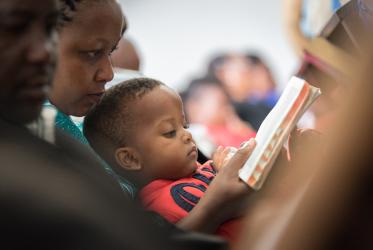*By Claus Grue
It is confirmation season in Greenland. In churches across the country, bench rows are decorated with flowers and candles along the aisle. Joy is in the air and it is time for a vast majority of 14-year-olds to have their Christian baptism confirmed.
Like elsewhere, confirmation is an opportunity for the church to reach out to young girls and boys and talk about Christian faith and life in general. For some, that includes a dialogue around serious traumas, such as sexual abuse and domestic violence, which an estimated one-third of the children in Greenland have witnessed or been victims of.
“It is our responsibility as Christians to invite people to a dialogue around their burdens and facilitate a healing process, so that childhood traumas can be dealt with professionally early on. That requires awareness, well-trained clergy and good pedagogical material”, explains Rev. Minna Winsløw, theological advisor and responsible for training and education at the diocese of Greenland.
One of her tasks is to equip priests and other personnel with tools to confront difficult issues and traumas, which they in many cases also may have experienced themselves.
Keeping children safe
Awareness about child abuse and violence has been raised globally through the World Council of Churches’ (WCC) commitment to child rights and the WCC Child Safeguarding Policy, which all employees and volunteers in parishes all over Greenland must be familiar with and sign.
“We continuously arrange courses around child rights and the policy has been implemented systematically. It is now included in the contract new employees sign upon recruitment”, Winsløw points out.
The next step is launching a comprehensive educational programme in trauma handling, developed by the American Bible Society Trauma Healing Institute and directed by missiologist Harriet Hill, co-author of a book titled “Healing the Wounds of Trauma”. The diocese of Greenland hopes to implement the programme later this year, when the material has been translated and tailored to local Greenlandic conditions.
“Handling traumas is largely a question of awareness, courage and pedagogical skills. In Greenland, challenges are extraordinary, since we are dealing with several - and often related - traumatic experiences. Sexual abuse, incest and violence are usually parts of a pattern where ethnic alienation, identity loss, alcoholism and suicide attempts are common ingredients. Our educational programmes must take such special circumstances into account in order to work in a local context”, Winsløw explains.
Spotting difficulties early
With a background as a school teacher, she has been trained to spot difficulties among children and teenagers at an early stage. That has come in handy in her current position, where her Christian faith and divine call as a priest complement pedagogical skills.
“The trauma handling programme is rooted in the Bible and based on modern psychological science. Every lecture in the programme includes cross references between these two. God’s mercy helps us healing our wounds”, says Winsløw.
The programme is targeted not only to youths but also to adults who have gone through similar traumas in their own childhood.
For confirmation purposes, the diocese of Greenland has developed its own pedagogical material, titled “The Pact – the answer to your questions”, which Winsløw herself has both written and illustrated.
“It is tailored for our context and specifically designed to facilitate a dialogue with youths around the same issues as our trauma handling programme. Traumatized youths often have difficulties in concentrating. Establishing a trustful dialogue around their situation is a pedagogical challenge”, Winsløw explains, adding that confirmation is the perfect opportunity for the church to engage in such dialogues.
When confirmations are done for now, she will take a summer break from her duties at the diocesan office in Nuuk, Greenland’s capital, and join the Arctic Commando as an army chaplain. Working with soldiers will be yet another experience to build on.
*Claus Grue is a communication consultant for the World Council of Churches.
Greenland church life and climate challenges featured in new series, WCC News Release 24th May 2019







